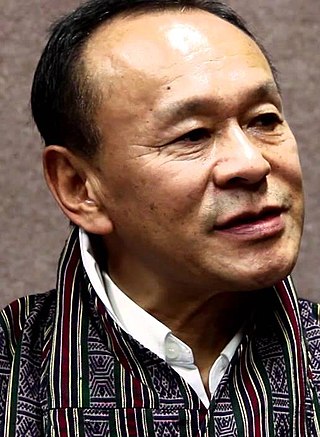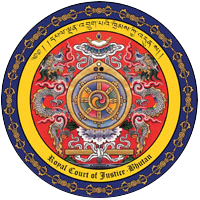Related Research Articles

The economy of Bhutan is based on agriculture and forestry, which provide the main livelihood for more than 60% of the population. Agriculture consists largely of subsistence farming and animal husbandry. Rugged mountains dominate the terrain and make the building of roads and other infrastructure difficult. Bhutan is among the richest by gross domestic product (nominal) per capita in South Asia, at $3,491 as of 2022, but it still places 153rd, and among the poorest in the world. The total gross domestic product is only $2,653 million, and 178th according to IMF.

Jigme Singye Wangchuck is a member of the House of Wangchuck who was the king of Bhutan from 1972 until his abdication in 2006. During his reign, he advocated the use of a Gross National Happiness index to measure the well-being of citizens rather than Gross domestic product.

Lyonpo Jigme Yoser Thinley is a Bhutanese politician who was Prime Minister of Bhutan from 20 July 1998 to 9 July 1999, 30 August 2003 to 18 August 2004 and 9 April 2008 to 28 April 2013.

Jigme Dorji Wangchuck was the 3rd Druk Gyalpo of Bhutan.

The Kingdom of Bhutan is divided into 20 districts. Bhutan is located between the Tibet Autonomous Region of China and India on the eastern slopes of the Himalayas in South Asia.

LyonpoKhandu Wangchuk is a political figure in Bhutan. He graduated from St. Stephen's College, University of Delhi. He was Chairman of the council from 2001 until 2002. On 7 September 2006, he became Prime Minister again; he was then replaced by Kinzang Dorji on 2 August 2007, after Wangchuk resigned to participate in the 2008 election as a member of the Druk Phuensum Tshogpa (DPT) political party. He also served as Minister of Foreign Affairs from 2003 to 2007.

Gross National Happiness, sometimes called Gross Domestic Happiness (GDH), is a philosophy that guides the government of Bhutan. It includes an index which is used to measure the collective happiness and well-being of a population. Gross National Happiness Index is instituted as the goal of the government of Bhutan in the Constitution of Bhutan, enacted on 18 July 2008.

Bhutan, officially the Kingdom of Bhutan, is a landlocked country in South Asia situated in the Eastern Himalayas between China in the north and India in the south. With a population of over 727,145 and a territory of 38,394 square kilometres (14,824 sq mi), Bhutan ranks 133rd in land area and 160th in population. Bhutan is a constitutional monarchy with a king as the head of state and a prime minister as the head of government. Vajrayana Buddhism is the state religion and the Je Khenpo is the head of the state religion.

LyonpoSangay Ngedup was Prime Minister of Bhutan from 1999 to 2000 and again from 2005 to 2006.

Tourism in Bhutan began in 1974, when the Government of Bhutan, in an effort to raise revenue and to promote Bhutanese unique culture and traditions to the outside world, opened its isolated country to foreigners. In 1974 a total of 287 tourists visited the Kingdom of Bhutan. The number of tourists visiting Bhutan increased to 2,850 in 1992, and rose dramatically to 7,158 in 1999. By the late 1980s tourism contributed over US$2 million in annual revenue.
Miss Bhutan is a national beauty pageant based in Bhutan. Since 2022, the winner will compete at Miss Universe pageant.

The High Court of Bhutan derives its authority from the 2008 Constitution of Bhutan. It consists of the Chief Justice and eight Drangpons. The Chief Justice and Drangpons of the High Court are appointed from among juniors, peers, and eminent jurists by the Druk Gyalpo. The judges of the High Court serve 10 year terms, or until reaching age 60; this retirement age is unique among the Civil Service and Constitutional Offices of Bhutan — all others retire at age 65. During their tenure, they are subject to censure and suspension by the Druk Gyalpo on the recommendation of the National Judicial Commission for proven misbehavior that does not rise to the level of impeachment.
The Tobacco Control Act of Bhutan was enacted by the Parliament of Bhutan on 6 June 2010 and came into force on 16 June. It regulates tobacco and tobacco products, banning the cultivation, harvesting, production, and sale of tobacco and tobacco products in Bhutan. The act also mandates that the government of Bhutan provide counselling and treatment to facilitate tobacco cessation. Premised on the physical health and well being of the Bhutanese people – important elements of Gross National Happiness – the Tobacco Control Act recognizes the harmful effects of tobacco consumption and exposure to tobacco smoke on both spiritual and social health.
Although for many decades, it was customary to focus on GDP and other measures of national income, there has been growing interest in developing broad measures of economic well-being. National and international approaches include the Beyond GDP programme developed by the European Union, the Better Lives Compendium of Indicators developed by the OECD, as well as many alternative metrics of wellbeing or happiness. One of the earliest attempts to develop such an index at national level was Bhutan's Gross National Happiness Index and there are a now a number of similar projects ongoing around the world, including a project to develop for the UK an assessment of national well-being, commissioned by the Prime Minister David Cameron and led by the Office for National Statistics.

Archery in Bhutan is the national sport of the Kingdom. Archery was declared the national sport in 1971, when Bhutan became a member of the United Nations. Since then, the popularity of Bhutanese archery has increased both inside and outside Bhutan, with a measure of government promotion. Bhutan also maintains an Olympic archery team. Previously, competitions were held only at dzongkhag and gewog levels, however modernly, archery tournaments and competitions are held throughout the country. Archery is played during religious and secular public holidays in Bhutan, local festivals (tsechu), between public ministries and departments, and between the dzonkhag and the regional teams. Archery tournaments and performances have also become a significant point of interest for tourism in Bhutan.
HIV/AIDS in Bhutan remains a relatively rare disease among its population. It has, however, grown into an issue of national concern since Bhutan's first reported case in 1993. Despite preemptive education and counseling efforts, the number of reported HIV/AIDS cases has climbed since the early 1990s. This prompted increased government efforts to confront the spread of the disease through mainstreaming sexually transmitted disease (STD) and HIV prevention, grassroots education, and the personal involvement of the Bhutanese royal family in the person of Queen Mother Sangay Choden.

Among Bhutan's most pressing environmental issues are traditional firewood collection, crop and flock protection, and waste disposal, as well as modern concerns such as industrial pollution, wildlife conservation, and climate change that threaten Bhutan's population and biodiversity. Land and water use have also become matters of environmental concern in both rural and urban settings. In addition to these general issues, others such as landfill availability and air and noise pollution are particularly prevalent in relatively urbanized and industrialized areas of Bhutan. In many cases, the least financially and politically empowered find themselves the most affected by environmental issues.

The World Happiness Report is a publication that contains articles and rankings of national happiness, based on respondent ratings of their own lives, which the report also correlates with various life factors. The report primarily uses data from the Gallup World Poll. As of March 2024, Finland has been ranked the happiest country in the world seven times in a row.
Kunzang Chhoden Namgyel became Bhutan's first female ambassador and the country's permanent representative to the United Nations in January 2014.
Namgay Zam is a Bhutanese journalist and activist. Having made her name as a producer and anchor on the public Bhutan Broadcasting Service, she served from 2019 to 2023 as executive director of the Journalists' Association of Bhutan. A 2016 lawsuit against Zam was considered the first test case of the country's press freedoms after its democratic transition.
References
- ↑ "His Excellency Lhatu Wangchuk". Washdiplomat.com. Retrieved 2012-08-06.
- ↑ "PRESS RELEASE" (PDF). Minitry of Foreign Affairs - Royal Government of Bhutan.
- ↑ "Ambassador Lhatu Wangchuk – Bhutan Foundation". Bhutanfound.org. 2011-06-05. Archived from the original on 2012-07-11. Retrieved 2012-08-06.
- ↑ Plett, Barbara (21 July 2011). "Bhutan spreads happiness to UN". BBC. Retrieved 22 July 2011.